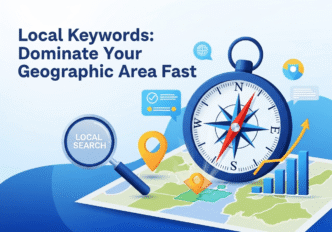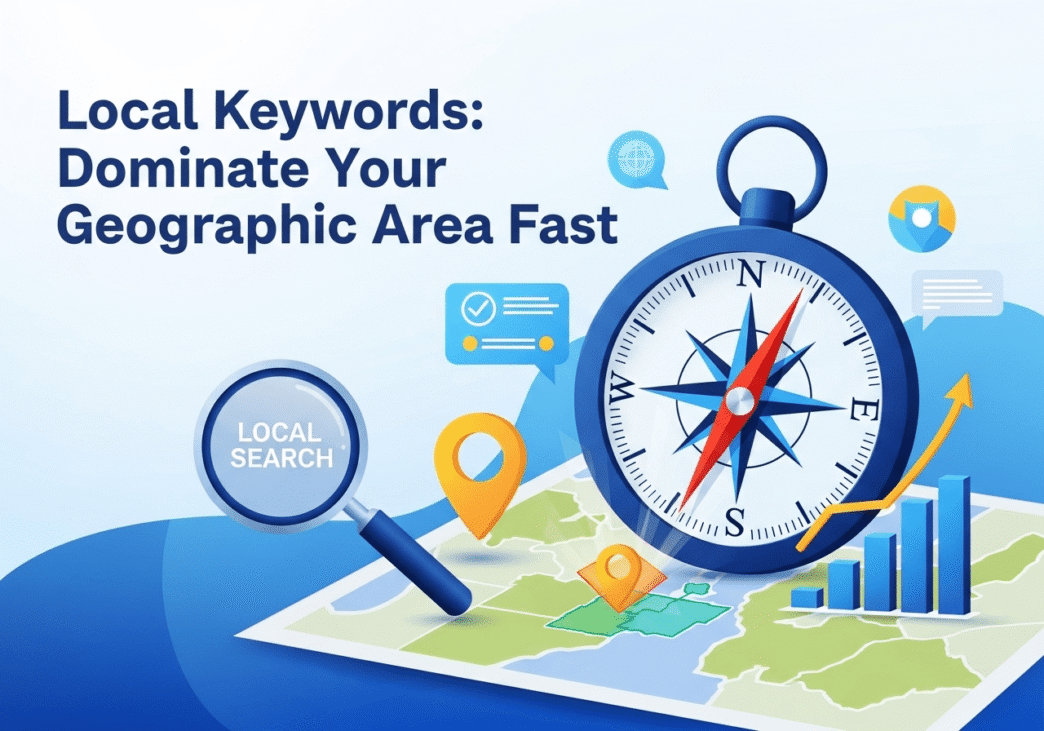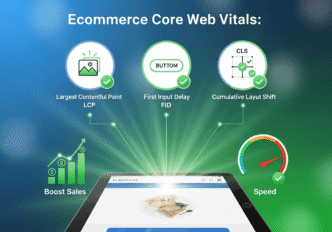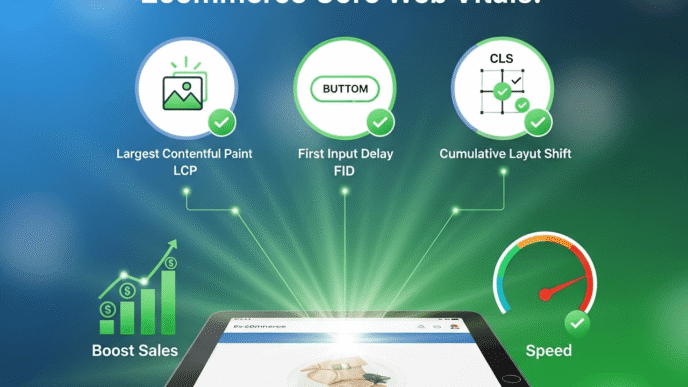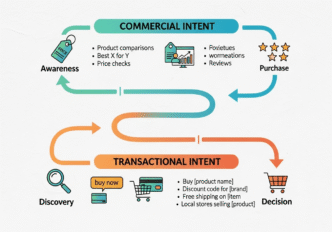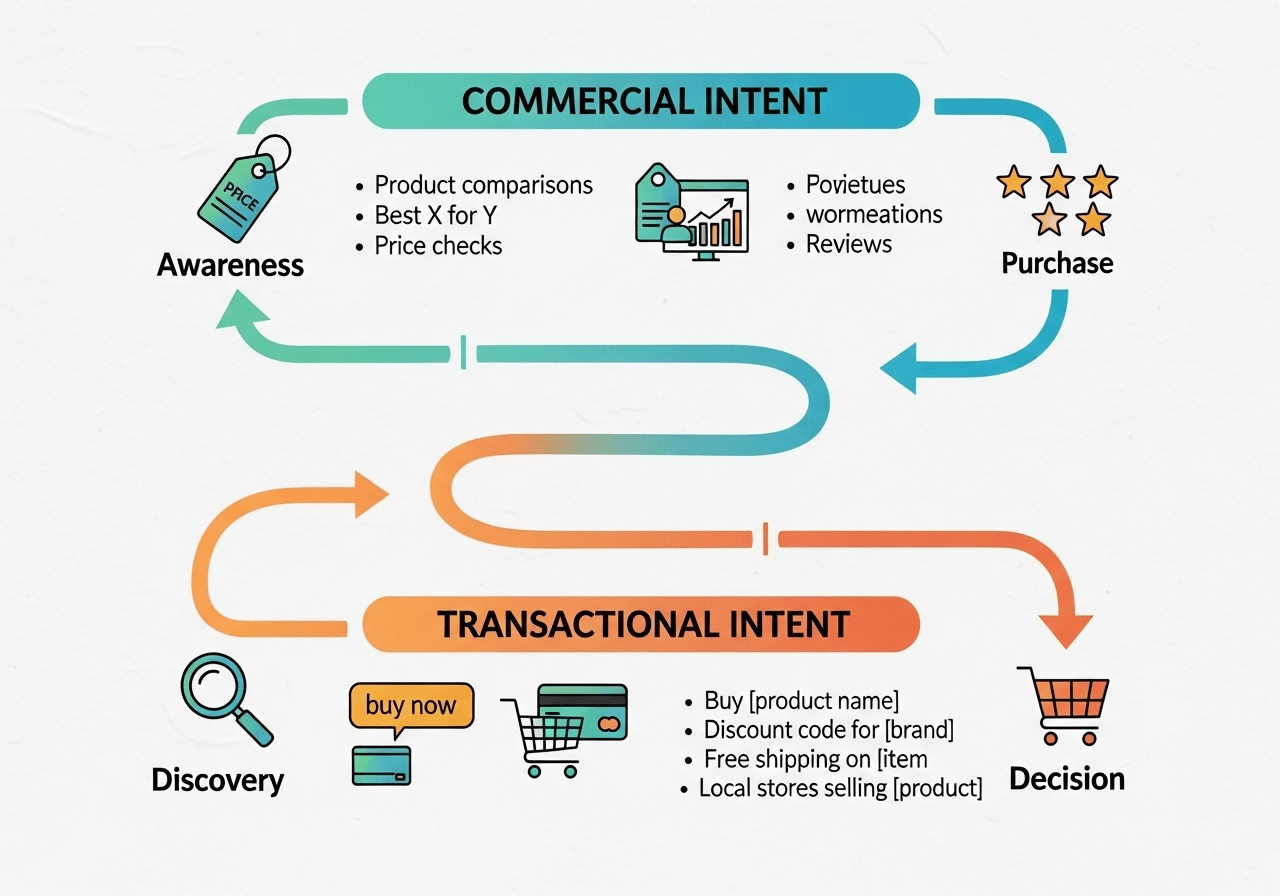Ever feel like you’re drowning in a sea of massive competitors while customers in your own neighborhood can’t even find you online? Here’s the plot twist: while giant corporations fight over generic terms like “plumber” or “restaurant,” smart local businesses are quietly dominating their geographic area with strategic local keyword research.
The secret sauce? Your location isn’t a limitation – it’s your competitive advantage! When someone searches “best pizza near me” at 9 PM on a Friday night, they’re not looking for Pizza Hut in another state. They want YOU, and local SEO keywords are your direct line to these high-intent, ready-to-buy customers.
Table of Contents
ToggleWhat Is Local Keyword Research? (Your Geographic Goldmine)
Local keyword research is the process of finding search terms that include geographic modifiers like city names, neighborhoods, or phrases like “near me.” These location-based keywords help your business appear when potential customers search for products or services in your specific area.
Think of it as the difference between shouting in Times Square versus talking directly to your neighbor over the fence. Geographic keywords let you have intimate conversations with people who can actually walk through your door.
According to Google’s research, 76% of people who search for something nearby visit a business within 24 hours, and 28% of those searches result in a purchase.
Pro Tip: Local searches have 4x higher conversion rates than generic searches because the intent is crystal clear – people aren’t just browsing, they’re ready to take action!
“Local keyword research is like having a secret map to buried treasure, where the treasure is customers who are literally around the corner from your business.” – Local SEO Expert
Why Should You Focus on Local SEO Keywords? (The Conversion Connection)
The Local Advantage Statistics:
📊 Immediate Action: 76% visit within 24 hours 📊 High Conversion: 28% make a purchase same day 📊 Mobile Dominance: 60% of local searches happen on mobile 📊 Voice Search Growth: 58% use voice for local business info
Real-World Success Story: The Pizza Shop That Beat Domino’s
Tony’s Family Pizza couldn’t compete with “pizza delivery” nationally. Instead, they focused on city-specific keywords:
- “Best pizza delivery downtown Springfield”
- “Family pizza restaurant near Lincoln High School”
- “Late night pizza delivery Springfield University area”
Result: Within 6 months, they outranked Domino’s and Papa John’s for local searches, increased orders by 145%, and became the #1 pizza spot in their city despite having 1/100th the marketing budget.
Key Insight: They didn’t try to beat giants at their own game – they dominated their own backyard instead.
How to Do Local Keyword Research for Small Business (Step-by-Step Guide)
Phase 1: Geographic Foundation Building
Step 1: Map Your Service Area
- List all cities/towns you serve
- Include neighborhood names
- Add nearby landmarks and districts
- Note ZIP codes if relevant
Step 2: Create Location Modifier Lists
- City + State combinations
- “Near me” variations
- Directional phrases (North Dallas, East Portland)
- Local landmark references
For comprehensive keyword research fundamentals, start with our complete keyword research foundation guide before diving into local strategies.
Phase 2: Service + Location Combinations
Formula: [Service] + [Location] = Local Gold
Examples:
- “Emergency plumber + Austin Texas”
- “Wedding photographer + downtown Seattle”
- “Yoga classes + near me”
- “Auto repair + Springfield”
Pro Tip: Don’t forget service variations! “Car repair,” “auto service,” and “vehicle maintenance” are all different ways people search for the same thing.
Local Keyword Research Tools and Strategies (Your Research Arsenal)
Free Tool Comparison:
| Tool | Best For | Location Targeting | Near Me Keywords Support |
|---|---|---|---|
| Google My Business Insights | Local performance data | Excellent | Yes |
| Google Keyword Planner | Search volume by location | Good | Limited |
| Google Trends | Local search trends | Excellent | Yes |
| AnswerThePublic | Question-based local queries | Good | Yes |
Paid Tool Powerhouses:
| Tool | Monthly Cost | Local Search Optimization Features | Best Feature |
|---|---|---|---|
| BrightLocal | $29+ | Local rank tracking | Local SERP analysis |
| Whitespark | $39+ | Local citation tracking | Local keyword suggestions |
| SEMrush | $119+ | Local keyword research | Geographic targeting |
| Ahrefs | $99+ | Local competitor analysis | Geo-targeted keywords data |
The Google My Business Intelligence Method
Your GMB insights are a goldmine most businesses ignore:
1. Query Analysis
- Check “How customers search for your business”
- Note exact phrases customers use
- Identify seasonal patterns
2. Local Competitor Research
- See who appears in your local pack
- Analyze their GMB keywords
- Study their business descriptions
3. Customer Review Mining
- Read what customers call your services
- Note location references they use
- Extract natural language patterns
Pro Tip: According to BrightLocal’s research, 87% of consumers read online reviews for local businesses, making review keywords crucial for local SEO!
Finding Location-Based Keywords That Convert (Advanced Techniques)
The Local Intent Hierarchy:
High Commercial Intent:
- “Buy [product] [location]”
- “[Service] near me open now”
- “Best [business type] in [city]”
- “[Emergency service] [location]”
Medium Commercial Intent:
- “[Service] [location] reviews”
- “Top [business type] [area]”
- “[Product] store [location]”
Informational Intent:
- “How to find [service] in [location]”
- “[Business type] [location] hours”
- “What is the best [location] for [activity]”
The Local Modifier Matrix
Primary Location Terms:
- City name + state
- City name alone (if unique)
- Metropolitan area names
- County names
Secondary Modifiers:
- Neighborhood names
- ZIP codes
- Nearby landmarks
- Directional indicators (North, South, East, West)
Proximity Phrases:
- “Near me”
- “Nearby”
- “Close to”
- “Walking distance from”
For detailed implementation of these strategies, check our local SEO keyword implementation guide.
Local SEO Keyword Research Best Practices (The Winning Formula)
Content Strategy for Local Keywords
1. Location Landing Pages Create dedicated pages for each service area:
- “[Service] in [City Name]”
- Unique content for each location
- Local testimonials and case studies
- Area-specific contact information
2. Local Business SEO Content Types:
- Neighborhood guides
- Local event coverage
- Community involvement stories
- Local partnership announcements
3. On-Page Optimization:
- Include city names in title tags
- Add location schema markup
- Use local keywords in meta descriptions
- Include NAP (Name, Address, Phone) consistently
Common Local Keyword Mistakes to Avoid
Mistake #1: Keyword Stuffing Locations Bad: “Best Denver pizza Denver restaurant Denver food Denver Colorado” Good: “Best pizza restaurant in Denver, Colorado”
Mistake #2: Ignoring Neighborhood Names Many businesses target the city but miss profitable neighborhood searches.
Mistake #3: Forgetting Mobile Voice Search People speak differently: “Where’s the closest coffee shop?” vs typing “coffee shop near me”
Mistake #4: Not Tracking Local Rankings Your rankings can vary dramatically by location within the same city.
Pro Tip: Use incognito mode and location settings to test how your site appears in different areas of your service region!
Geographic Keyword Research for Local Businesses (Case Studies)
Case Study 1: HVAC Company Expansion
Challenge: Mountain View HVAC wanted to expand from one city to five neighboring areas.
Local Keyword Strategy:
- “HVAC repair [each city name]”
- “Air conditioning service near [local landmarks]”
- “Heating contractor [neighborhood names]”
- “Emergency HVAC [city] after hours”
Implementation:
- Created separate landing pages for each city
- Added location-specific service descriptions
- Included local customer testimonials
- Optimized Google My Business for each area
Results After 8 Months:
- 280% increase in local search visibility
- 156% more qualified leads
- Successful expansion into all 5 target markets
- $340,000 additional annual revenue
Case Study 2: Dental Practice Domination
Challenge: New dental practice competing with established 20-year practices.
Winning Strategy:
- “Family dentist [neighborhood names]”
- “Dental implants near [local shopping centers]”
- “Emergency dentist [city] weekend hours”
- “Pediatric dentist [school district names]”
Results:
- Ranked #1 for 15+ local dental keywords within 4 months
- Booked solid for 6 months in advance
- 90% of new patients came from local search
For more local SEO success strategies, explore our comprehensive local optimization playbook.
Advanced Local Keyword Research Strategies (Level Up Your Game)
The Competitor Gap Analysis Method
Step 1: Identify your top 5 local competitors Step 2: Use SEMrush or Ahrefs to export their local keywords Step 3: Filter for location-based keywords in your area Step 4: Find gaps where they rank but you don’t Step 5: Create superior content targeting those gaps
The Local Trend Spotting Technique
Seasonal Opportunities:
- “Christmas tree farm [city]” (November-December)
- “Tax preparation [location]” (January-April)
- “Pool cleaning service [area]” (April-September)
Event-Based Keywords:
- “[City] marathon training”
- “Wedding venues near [landmark]”
- “Graduation party catering [location]”
The Voice Search Optimization Approach
Traditional Search: “dentist Springfield” Voice Search: “Where’s the best dentist near me that’s open today?”
Optimization Strategy:
- Target full question phrases
- Include conversational long-tail keywords
- Answer common local questions
- Optimize for featured snippets
Pro Tip: According to Search Engine Land, 22% of local businesses report voice search driving significant foot traffic increases!
Local Search Optimization Tools Comparison (Your Technology Stack)
Essential Free Tools:
Google My Business Dashboard
- Performance insights
- Customer search queries
- Competitor visibility data
- Review and Q&A management
Google Search Console
- Local search performance
- Geographic impression data
- Click-through rates by location
- Local ranking positions
Google Trends
- Regional interest comparison
- Seasonal trend identification
- Related query discovery
- Geographic popularity maps
Professional Paid Solutions:
BrightLocal ($29-199/month)
- Local rank tracking across multiple locations
- Citation building and management
- Local SEO audit tools
- Review monitoring and response
Whitespark ($39-149/month)
- Local keyword suggestion tool
- Citation finder and builder
- Local ranking reports
- Reputation management
For detailed tool selection criteria, reference our local SEO tools comparison guide.
Your 30-Day Local Keyword Domination Plan
Week 1: Research and Discovery
- Map your complete service area
- List all location + service combinations
- Analyze local competitor keywords
- Set up Google My Business optimization
Week 2: Content Planning and Creation
- Create location-specific landing pages
- Write local business SEO optimized content
- Develop neighborhood-focused blog posts
- Plan local link building outreach
Week 3: Technical Implementation
- Add location schema markup
- Optimize title tags with city names
- Update meta descriptions for local terms
- Ensure NAP consistency across all pages
Week 4: Monitoring and Optimization
- Set up local ranking tracking
- Monitor Google My Business insights
- Track local search console performance
- Plan month 2 expansion strategies
Success Metrics for Local Keyword Research (Measuring Your Impact)
Primary KPIs to Track:
📊 Local Search Rankings – Positions for target geo-targeted keywords 📊 Google My Business Views – Profile visibility increases 📊 Local Pack Appearances – How often you appear in map results 📊 “Near Me” Search Traffic – Mobile local search growth 📊 Store Visits – Physical location traffic from online searches 📊 Local Conversion Rates – Calls, directions, and contact form submissions
Expected Timeline Results:
Month 1: Foundation setup, initial content creation Month 2-3: First ranking improvements for city-specific keywords Month 4-6: Significant local visibility increases Month 6+: Market domination for target geographic areas
“Businesses that implement systematic local keyword research see an average 200% increase in local search visibility within 6 months, according to Moz’s Local Search Ranking Factors study.”
Final Thoughts: Your Local Market Awaits
Local keyword research isn’t just about adding your city name to existing keywords – it’s about understanding the unique language and needs of your geographic community. While national brands fight over impossible keywords, you’re building meaningful connections with customers who can actually walk through your door.
The beauty of local SEO lies in its immediacy and relevance. When someone searches for “emergency plumber near me” at 11 PM, they’re not comparison shopping – they’re looking for immediate help from someone nearby. That someone should be you.
Remember: your geographic area isn’t a limitation on your SEO success – it’s your competitive moat. Use location-based keywords to build deep relationships with your local community, and watch as your phone starts ringing with qualified, ready-to-buy customers.
Start with one city, master the fundamentals, then expand your geographic reach systematically. Your local market domination begins with understanding exactly how your neighbors search for what you offer.
Ready to become the local authority in your industry? Start implementing these local search optimization strategies today and watch your business become the go-to choice in your area.
For comprehensive implementation support, don’t miss our complete local SEO strategy guide that turns research into revenue.
Frequently Asked Questions
Q: How is local keyword research different from regular keyword research? A: Local keyword research focuses on geographic modifiers and location-specific intent. Instead of targeting “dentist,” you target “dentist in Springfield” or “family dentist near me,” which have higher conversion rates and less competition.
Q: Should I create separate pages for each city I serve? A: Yes, if you can create unique, valuable content for each location. Avoid thin content – each city page should offer genuine local value, not just the same content with different city names.
Q: How important are “near me” keywords for local businesses? A: Extremely important! “Near me” searches grew 150% faster than “Where to buy” searches according to Google. These searches often come from mobile users ready to take immediate action.
Q: Can I rank for local keywords if I don’t have a physical location? A: It’s challenging but possible for service area businesses. Focus on the areas you serve, create location-specific content, and ensure your Google My Business accurately reflects your service areas.
Q: How long does it take to see results from local keyword optimization? A: Local SEO typically shows faster results than national SEO. You might see improvements in 4-8 weeks, with significant gains in 3-6 months, especially for less competitive local terms.
Q: Should I include ZIP codes in my local keywords? A: Sometimes! ZIP codes work well for areas where people commonly reference them (like “10001 dentist” in NYC) but are less effective in areas where neighborhoods or city names are more common.
🎯 Local SEO Transformation
Before & After: Location-Specific Keywords Impact
BEFORE
Generic Keywords Only
- plumber No Rank
- emergency plumbing 87
- plumbing services 64
- drain cleaning 45
- water heater repair No Rank
AFTER
Location-Specific Keywords
- plumber Austin Texas 3
- emergency plumber near me 1
- plumbing services downtown Austin 2
- drain cleaning South Austin 1
- water heater repair Austin TX 4
🚀 Total Transformation Results
6 months of strategic local keyword optimization
📋 Real Case Study Details
❌ Previous Strategy Problems:
- Targeting impossible national keywords
- Competing with HomeAdvisor, Angie's List
- No local geographic targeting
- Generic service descriptions
- Poor local search visibility
✅ New Local Strategy:
- City + neighborhood specific keywords
- "Near me" optimization
- Local landing pages for each area
- Google My Business optimization
- Location-based content creation
💡 Key Success Factors:
Location-Specific Content: Created dedicated pages for "Plumber in [Neighborhood]" for all 15 Austin neighborhoods.
Local Schema Markup: Added structured data for each service area with specific NAP information.
Google My Business: Optimized with local keywords, regular posts, and customer review management.
🔑 Key Takeaways for Your Business
1. Location Modifiers Work
Adding city names, neighborhoods, and "near me" phrases dramatically improves ranking potential.
2. Lower Competition
Local keywords have 70% less competition than generic national terms.
3. Higher Conversion
Local searchers convert 4x better because they're ready to take action.
4. Faster Results
Local SEO shows results in 2-4 months vs 6-12 months for national SEO.

